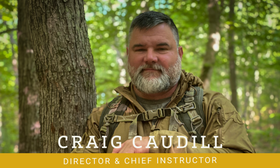NRS Online Membership

Mastering the Art and Science of Tracking: A Conversation with Mike Hull of Hull's Tracking Services
Mastering the Art and Science of Tracking
Craig Caudill interviews Mike Hull, a renowned tracking instructor and owner of Hull's Tracking Services. Mike shares his journey from becoming a State game warden in 1980 to developing a passion for tracking, influenced by instructors like Charles Worsham and David Scott-Donelan. He discusses the importance of practical experience over book knowledge, the challenges of tracking in various environments, and the significance of maintaining law enforcement credentials to apply tracking skills in real cases. Mike emphasizes the need for trackers to be honest with themselves and to focus on ground sign while maintaining situational awareness. He also highlights the value of tracking in modern law enforcement and military applications.
Mike Hull's Introduction and Background
- Craig Caudill introduces Mike Hull, highlighting his role as the owner and lead instructor of Hull's Tracking Services in Virginia.
- Craig emphasizes Mike's significant influence on his life and career as a tracking instructor.
- Mike Hull joins the conversation, and Craig expresses his appreciation for Mike's mentorship and generosity in sharing knowledge and training materials.
- Mike shares his background, starting with his passion for bow hunting and his transition to becoming a State game warden in 1980.
Early Tracking Experiences and Influences
- Mike explains how tracking became part of his daily activities as a game warden, initially for finding poachers and trespassers.
- He describes the confusion and lack of organization in tracking during his early career and his curiosity about the viability of tracking in modern times.
- Mike sought out professional trackers and various instructors to learn more about tracking, attending multiple classes to gather diverse perspectives.
- He mentions Charles Worsham as a significant influence, who taught him the importance of perception and visualization in tracking.
Advanced Tracking Techniques and Tactical Applications
- Mike discusses his work with David Scott-Donelan, who incorporated tactical applications of tracking from South Africa.
- He highlights the importance of practical experience in the field, contrasting book knowledge with real-world applications.
- Mike shares his role as a special deputy, retaining his law enforcement credentials to assist in breaking and entering cases and tracking lost individuals.
- He outlines the structure of his tracking courses, including tactical tracking, team formations, and surveillance exercises.
Challenges and Overcoming Contamination
- Mike addresses the common challenge of over-analyzing tracks and the importance of moving out far enough to avoid contamination.
- He emphasizes the need for trackers to be honest with themselves and recognize when they have lost the track.
- Mike explains the process of lost spore procedures and the importance of looking out in front of oneself to see disturbances.
- He shares his experience of tracking with Navy SEALs and the importance of moving out far enough to see tracks clearly.
Advanced Tracking Techniques and Tactical Applications
- Mike discusses the importance of recognizing human tracks by their size, shape, and regularity, and distinguishing them from animal tracks.
- He explains the significance of trail width and how it varies between different animals and humans.
- Mike emphasizes the need for trackers to keep their eyes moving and not to over-analyze the ground, as this can lead to speculation and confusion.
- He shares his approach to tracking, which involves looking out in front of oneself and confirming tracks with physical evidence.
The Role of Technology and the Importance of Practical Skills
- Mike discusses the limitations of technology in tracking, particularly in urban and jungle environments.
- He emphasizes the importance of practical skills and the ability to read and interpret ground sign.
- Mike shares his experiences of tracking in various environments, including the Appalachian Mountains, deserts, and jungles.
- He highlights the need for trackers to be adaptable and able to apply their skills in different conditions.
The Future of Tracking and Its Value in Law Enforcement
- Mike discusses the future of tracking and its importance in law enforcement and military applications.
- He emphasizes the value of tracking in gathering intelligence and solving cases, citing examples from his own career.
- Mike highlights the importance of training and mentoring the next generation of trackers to ensure the continuation of these skills.
- He shares his plans to write a new book that includes more stories and examples of how tracking has been used in real cases.
The Importance of Practical Experience and Application
- Mike emphasizes the importance of practical experience and the ability to apply tracking skills in real-world situations.
- He shares his experiences of training with various instructors and the value of hands-on learning.
- Mike discusses the importance of sharing knowledge and experiences with others to build a strong tracking community.
- He highlights the value of tracking in developing character traits such as honesty, responsibility, and persistence.
The Role of Tracking in Modern Law Enforcement and Military Applications
- Mike discusses the role of tracking in modern law enforcement and military applications, emphasizing its importance in gathering intelligence and solving cases.
- He shares his experiences of training with various military and law enforcement agencies and the value of tracking in these contexts.
- Mike highlights the importance of combining tracking with other skills, such as canine tracking, to enhance overall effectiveness.
- He emphasizes the need for trackers to be adaptable and able to apply their skills in different environments and situations.
The Importance of Mentorship and Continuing Education
- Mike discusses the importance of mentorship and continuing education in the field of tracking.
- He shares his experiences of training with various instructors and the value of learning from others.
- Mike emphasizes the importance of sharing knowledge and experiences with others to build a strong tracking community.
- He highlights the value of practical experience and the ability to apply tracking skills in real-world situations.
Final Thoughts and Reflections
- Mike reflects on the impact of tracking on his life and career, emphasizing its role in developing character traits such as honesty and persistence.
- He shares his experiences of training with various instructors and the value of hands-on learning.
- Mike discusses the importance of sharing knowledge and experiences with others to build a strong tracking community.
- He emphasizes the value of practical experience and the ability to apply tracking skills in real-world situations.
Associated Links
https://hullstrackingschool.com/

